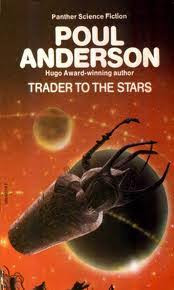Poul Anderson, "Margin of Profit," see here.
"This tiny, outlying corner of the galaxy which Technic civilization has slightly explored is that big and various." (p. 149)
Here is yet another expression of that galactic perspective. See The Narrator And The Spiral Arm. ("We are so small and the galaxy is so big," sort of thing.)
More malaprops:
"'Rathermore, they do expect we will soon shun their territory, like you now want us to. That suits their masters well, not having foreign influentials....'" (p.144)
"'I have had more such programs run through the computers than there is politicians in hell... They every one give the same grismal answer.'" (p. 149)
"Grismal" is a portmanteau word: "grisly" + "dismal."
Van Rijn reflects:
"A long time now since he had been any further than the Moon...poor, aging fat man, chained to a single planet..." (p. 147)
Thus, it is established in his very first story that van Rijn is already at this later stage of life:
"poor" means "pitiable," not "impoverished";
"aged" - that happens to us all;
"fat" - enjoying food and drink is a life-style choice but it does not prevent him from handling himself in a fight when necessary (isn't there a passage where a character realizes that van Rijn's bulk is not all fat?);
"chained to a single planet" - after this, he finds reasons to leave the Solar System in this story, then in The Man Who Counts, "Hiding Place," "Territory," Satan's World, "Lodestar" and Mirkheim. But there has to be a particular reason each time. In "Esau," "The Trouble Twisters" and "The Master Key," he stays on Earth.

10 comments:
Though this is one point where Poul's work shows its age -- I would expect that a civilization at the Technic level would have the biological knowledge to adjust the metabolism easily to increase the "static burn" of a human body.
Sf dates. But maybe not PA's GENESIS for a very long time?
Kaor, Paul and Mr. Stirling!
Paul: The idea of Nicholas van Rijn being PITIABLE makes me laugh! And I have a vague recollection of him sometimes bemoaning how "poor" he was in the sense of needing to earn a few more credits to stave off a completely impoverished old age. Which, again, makes me laugh!
Mr. Stirling: What you suggest would certainly make controlling one's weight a lot easier! But maybe Old Nick LIKED being fat? And we know there was hard muscle under that fat.
Sean
People in the 50's and 60's didn't anticipate how many breakthroughs there would be in the biological sciences, I think.
Looking ahead, it must be necessary to anticipate advances in all the sciences and maybe also the creation of new sciences.
Kaor, Mr. Stirling!
Sometimes I come across people online who insist they will live to age 150 or even 200. Maybe that will be possible in five hundred years, but I find it hard to think of it as being likely for people alive now.
And I have seen speculations about cloning new organs for people who need to replace worn out organs. Or cloning lost limbs. But I seriously doubt that will be practical in our times.
I first clearly came across the notion of using our DNA pattern for replacing lost limbs and organs far too long ago, when I was a boy, while reading ENSIGN FLANDRY.
Sean
Re: "Fat, old, Nick": I recall in (I think) one of the Man-Kzin War stories about someone who was fat besides taking lots of "metaboline".., I suspect there are many medical advances forthcoming (such as speeding up one's metabolism), but I suspect there may be some nasty side effects associated with many of them.
IMHO, there seems to be a common assumption in SF (and other areas) that new positive developments will come easily, cheaply, quickly, and with minimal or no side effects. As example: Technic History FTL seems to be comparable in cost to air travel today or at very least much cheaper than travel to LEO is today.
-kh
LEO?
Kaor, Paul!
Keith meant by the LEO acronym "low Earth orbit."
Sean
Thank you, Sean.
-kh
Post a Comment